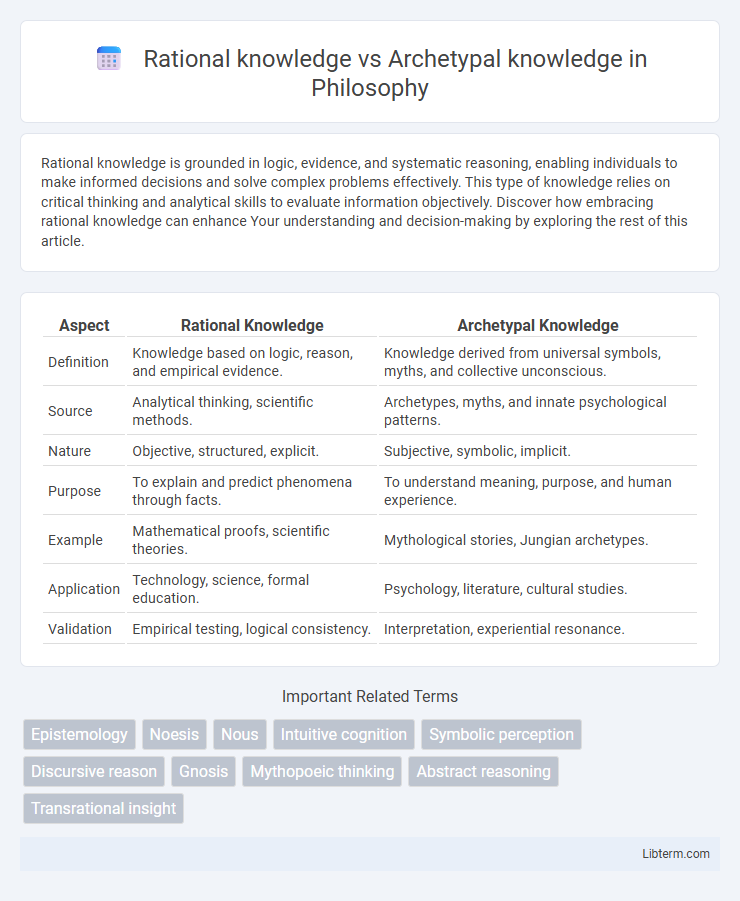Rational knowledge is grounded in logic, evidence, and systematic reasoning, enabling individuals to make informed decisions and solve complex problems effectively. This type of knowledge relies on critical thinking and analytical skills to evaluate information objectively. Discover how embracing rational knowledge can enhance Your understanding and decision-making by exploring the rest of this article.
Table of Comparison
| Aspect | Rational Knowledge | Archetypal Knowledge |
|---|---|---|
| Definition | Knowledge based on logic, reason, and empirical evidence. | Knowledge derived from universal symbols, myths, and collective unconscious. |
| Source | Analytical thinking, scientific methods. | Archetypes, myths, and innate psychological patterns. |
| Nature | Objective, structured, explicit. | Subjective, symbolic, implicit. |
| Purpose | To explain and predict phenomena through facts. | To understand meaning, purpose, and human experience. |
| Example | Mathematical proofs, scientific theories. | Mythological stories, Jungian archetypes. |
| Application | Technology, science, formal education. | Psychology, literature, cultural studies. |
| Validation | Empirical testing, logical consistency. | Interpretation, experiential resonance. |
Defining Rational Knowledge
Rational knowledge is defined as understanding derived from logical reasoning, empirical evidence, and systematic analysis. It emphasizes objective truths, critical thinking, and the coherent organization of facts to draw valid conclusions. This form of knowledge contrasts with archetypal knowledge, which stems from symbolic, intuitive, and culturally inherited patterns.
Exploring Archetypal Knowledge
Archetypal knowledge taps into universal symbols and collective unconscious patterns that shape human experience, enabling deeper understanding beyond rational analysis. This form of knowledge enriches intuition, myth, and creativity by connecting individual insights to timeless, cross-cultural archetypes. Exploring archetypal knowledge reveals hidden psychological frameworks essential for personal growth and transformative storytelling.
Historical Roots of Rationalism
Rational knowledge, rooted in the philosophical traditions of ancient Greece, emphasizes logic, deduction, and empirical evidence as pathways to understanding reality. Historically, rationalism gained prominence with thinkers such as Descartes, Spinoza, and Leibniz, who argued that reason is the primary source of knowledge, contrasting with archetypal knowledge that draws from symbolic, mythological, and intuitive insights. The historical roots of rationalism are deeply embedded in the Enlightenment era, which sought to replace mythos with logos, prioritizing scientific inquiry, clear reasoning, and systematic doubt to uncover objective truths.
The Role of Archetypes in Human Understanding
Archetypal knowledge serves as a foundational framework in human understanding by representing universal symbols and patterns deeply embedded in the collective unconscious. Unlike rational knowledge, which relies on logical analysis and empirical data, archetypal knowledge taps into intuitive insights and emotional resonance, shaping perceptions and decision-making processes. The role of archetypes is vital in interpreting myths, dreams, and cultural narratives, providing a shared language for human experiences across diverse societies.
Key Differences Between Rational and Archetypal Knowledge
Rational knowledge relies on logical reasoning, empirical evidence, and analytical thought processes to acquire understanding, emphasizing clarity and objectivity. Archetypal knowledge, rooted in symbolic patterns and collective unconscious, captures universal themes and intuitive insights that transcend specific contexts. The key difference lies in rational knowledge's dependence on measurable facts versus archetypal knowledge's foundation in metaphorical and experiential wisdom.
Practical Applications of Rational Knowledge
Rational knowledge, grounded in logic, analysis, and empirical evidence, finds practical application in fields such as engineering, medicine, and technology development, where systematic problem-solving and data-driven decision-making are essential. This type of knowledge enhances innovation through algorithm design, scientific research, and process optimization, enabling precise predictions and efficient resource management. In contrast to archetypal knowledge, which is rooted in symbolic and mythological frameworks, rational knowledge drives tangible advancements by focusing on measurable outcomes and objective criteria.
Influence of Archetypal Knowledge in Culture and Psychology
Archetypal knowledge profoundly shapes culture and psychology by embedding universal symbols and themes that transcend individual experiences, influencing myths, rituals, and collective behavior. This deep-rooted knowledge operates through shared unconscious patterns, guiding identity formation and emotional responses within societies. In contrast to rational knowledge, which relies on logic and empirical data, archetypal knowledge fosters intuitive understanding and cultural continuity by connecting individuals to innate psychological structures.
Intersections: Where Rational and Archetypal Knowledge Converge
Rational knowledge, rooted in logical analysis and empirical evidence, intersects with archetypal knowledge through shared patterns and symbols that reveal universal truths across cultures. Both forms of knowledge converge in disciplines like psychology and mythology, where archetypal themes are examined using rational frameworks to understand human behavior and collective unconscious. This intersection enhances the depth of understanding by combining structured reasoning with profound symbolic insight.
Criticisms and Limitations of Both Knowledge Types
Rational knowledge often faces criticism for its reliance on empirical data and logical structures, which can overlook subjective experiences and intuitive insights crucial for holistic understanding. Archetypal knowledge is limited by its symbolic and mythic nature, making it prone to interpretative bias and lacking empirical validation. Both knowledge types struggle to fully encompass the complexity of human cognition, as rational knowledge neglects emotional depth while archetypal knowledge lacks rigorous evidence.
The Future of Knowledge: Integrating Rational and Archetypal Perspectives
The future of knowledge hinges on synthesizing rational knowledge, grounded in empirical evidence and logical analysis, with archetypal knowledge, which stems from universal symbols and collective unconscious patterns. This integration fosters a holistic understanding that leverages data-driven insights alongside intuitive, mythic frameworks, enabling more nuanced decision-making in complex systems. Emerging technologies in artificial intelligence and cognitive science facilitate this fusion, enhancing human cognition by bridging analytic rigor with symbolic depth.
Rational knowledge Infographic

 libterm.com
libterm.com